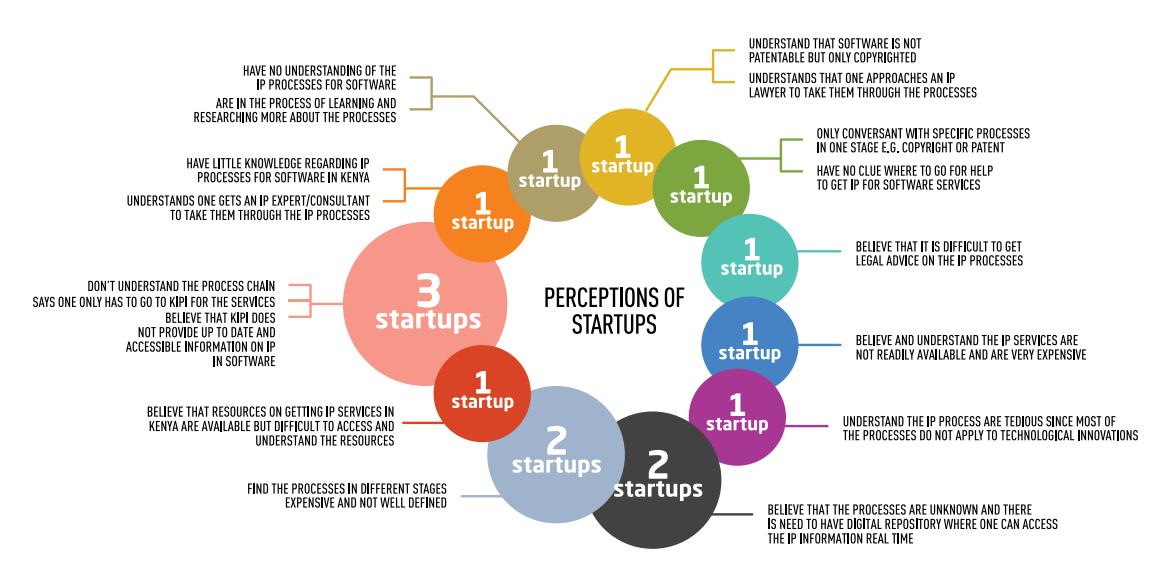Intellectual Property in ICT: The Challenge of Changing Perceptions Among Start-ups in Kenya
- Victor Nzomo |
- December 27, 2012 |
- CIPIT Insights
Blame ought to be directed to African startups for patenting things that can easily be discovered by competitors and failing to keep them as trade secrets. – Cisco Senior Vice President, Howard Charney.
Recently iHub Research released an insightful report titled “Intellectual Property in Technological Innovations: Perceptions from Tech Start-ups in Kenyan ICT Hubs”, which is available online here.
The 45-page report published in late November 2012 was the result of an exploratory research with 15 tech startups through in-depth interviews. Here are some of the findings:
1. Only 7% of respondents understand the processes of IP protection and where to go for advice/help and other IP-related services.
2. Over 60% of respondents believe that IP-related information and/or services are difficult to understand, expensive, tedious and in most cases not readily available.
3. Out of the 87% of respondents who claimed to know where to go to seek IP services, 77% of them named KIPI as their first port of call, followed by KECOBO and CIPIT both at 8%.
4. None of the respondents had taken any step to file a patent for their ICT-based innovations despite 87% of them having their products readily available in the Kenyan market.
5. Over 67% of the respondents have not seriously considered copyright protection for their tech innovations with the majority saying “they have not really thought about the whole process and were working on growing their brand first”
6. Over 93% of the respondents had not considered trade secrets protection for their tech innovations largely because they did not understand the process.
7. Over 67% of the respondents have not registered their tech products’ names and logos as trademarks largely due to what the report describes as ‘small company syndrome’, which is defined as the perception that the trademark system is a preserve of the ‘big companies’ that have huge financial backing and can afford to protect their IP way beyond their local jurisdiction. There was also the perception that ‘trademarking’ was ‘not a vital and necessary step in their business structure.’
8. 87% of the respondents had not conducted any searches and/or assessed the intellectual property rights of their competitors, largely because they found the process expensive and saw no need to conduct it as they felt that they had no competition.

The Report goes on to make several recommendations directed at the Government, ICT Hubs and Private IP experts and entities:
1. The Government should play a more active role in enforcement of IP laws, which respondents in the Study percieved as a ‘toothless’.
2. The Government should encourage tech start-ups to use the IP system by providing incentives such as tax holidays and subsidies.
3. The Government should increase their human capacity to address issue of awareness creation
4. The Government should put in place processes and systems that are transparent, up-to-date and readily accessible to the public.
5. ICT hubs ought to consider having customer services that all innovators to access information and interact with IP experts in real-time.
6. ICT hubs ought to facilitate practical IP events and workshops where IP experts and tech innovators can meet and share knowledge.
7. ICT hubs ought to publish more on IP in IT subject matter, including case studies, success stories, etc.
8. ICT hubs ought to engage with tech startups on the benefits, opportunities and hidden costs involved in using the IP system
9. ICT hubs ought to promote a culture of IP rights through collaborations particularly with Government
10. Private IP experts and entities are encouraged to take time to understand the background of tech startups
11. Private IP experts and entities are encouraged to make their charges IP services affordable
12. Private IP experts and entities are encouraged to spread their skills and expertise with other professionals so to increase the numbers of personnel that are versed in IP and IP in ICT.
Comment:
The report by iHub Research underscores the ever-present need to demystify intellectual property in Kenya.
IP knowledge and expertise must move from being the preserve of a handful of lawyers and spread to other professionals such as inventors, innovators and entrepreneurs who are actively involved in IP-intensive sectors of the economy.
Startups in particular must be sensitised on the different subject matter of IP protection and the attendant formal and substantive requirements. Startups also require direct access to IP practitioners who will be able to enlighten, advise, guide and assist startups in all matters relating to IP. More specifically, it is clear from the report that startups want practical advice in IP and licensing matters as opposed to merely general views and recital of IP laws. This type of specialised IP assistance requires IP experts to invest time in understanding individual startups and the nature of their business and the type of technological innovations involved.

